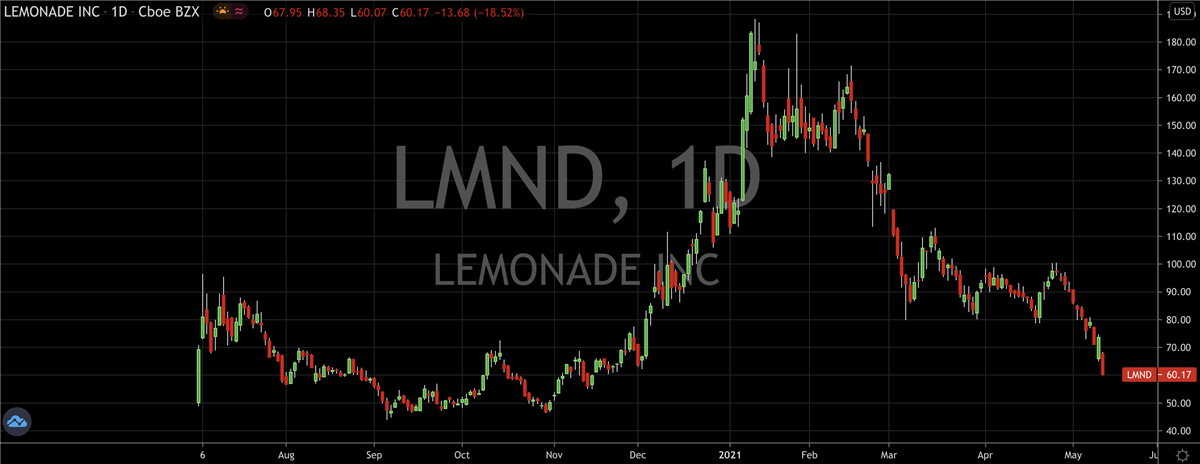
It wasn't so long ago that Lemonade (
NYSE: LMND) investors were sitting high and mighty, after a 300% run in less than three months had shares up around 4x from where they IPO’d. But like with many of 2020’s highest flyers, 2021 has brought them back down to earth in quick fashion.
Off the back of a worryingly fast-growing inflation print, a higher interest rate environment is hurting any stock that falls under the growth category. This includes the likes of tech powerhouses such as Apple (NASDAQ: AAPL) but in particular smaller pre-profit names like Lemonade. The New York-headquartered insurance tech company arrived on the scene last summer at just the right time, when the post-pandemic equity recovery was starting to gather steam. But a few dodgy earnings reports since have taken the shine off a stock that risks becoming a has-been.
Weak Earnings
After the market closed on Tuesday evening, investors and Wall Street got a fresh look at Lemonade’s numbers. They didn’t make for pretty reading. Revenue was down 10% on the year, while bottom line EPS was firmly in the red and below what analysts were expecting. But in their letter to shareholders, management chose to instead focus on the positives and pointed to the 50% year on year growth in customer numbers and 84% growth year on year in earned premiums.
They also spoke to the company’s diversification plans, in particular their expansion into car insurance. In their letter they pointed out how “our newborn products are graduating from infancy ever faster. It took several years to achieve profitable unit economics for our home insurance products, but for Lemonade Pet it took just a few months. This acceleration is largely enabled by channel diversification, improving brand awareness, and a machine-learning-driven growth engine that constantly iterates to improve each step of our onboarding funnel. As we look ahead to scaling our term life and car insurance products, we are heartened by our recent track record of launching new products that achieve compelling unit economics while driving topline growth in short order.”
For all that positivity though, there was no getting away from the fact that in the short term, this report created more pain rather than the other way around. In tandem with the weak front page prints, Credit Suisse analyst Andrew Kligerman felt that Lemonade’s higher-than-expected catastrophe losses were responsible for a lot of the miss. William Blair analyst Ralph Schackart picked up on this as well, and pointed to the surprisingly bad storms in Texas earlier this year as the primary culprit. You would think, and maybe even hope, that these are fairly rare events and that without them it might have been a much nicer picture.
But Lemonade shares still fell by more than 18% in yesterday’s session as they closed at their lows. In Thursday’s pre-market session they were down a further 5%, causing more pain to existing shareholders but potentially opening up an opportunity for those of us on the sideline.
Considering The Long Game
There’s no doubt that in the short term Lemonade is unlikely to be a welcome addition in any portfolio, but we’ve seen many tech companies essentially implode in their first year of trading before going on to stage a solid comeback as they find their feet. Look at Snap (NYSE: SNAP) and Lyft (NASDAQ: LYFT) as examples for this.
Though they’re experiencing some major growing pains, Lemonade is also among those at the forefront of disruption to one of the world’s oldest industries and isn't going away anytime soon. Their move into car insurance opens them up to a $300 billion market, which is 70x that of their existing pet and renter insurance markets combined. This is still a company that commands a $110 price target from Oppenheimer and a $163 price target from Piper Sandler. So with shares set to open around $57 today, there are worse stocks to consider for those of us with a long enough time horizon.
If management can start making the right moves to get the company trending towards consistent profitability, then the sky's the limit for what Lemonade could achieve in the years to come.

Before you consider Lemonade, you'll want to hear this.
MarketBeat keeps track of Wall Street's top-rated and best performing research analysts and the stocks they recommend to their clients on a daily basis. MarketBeat has identified the five stocks that top analysts are quietly whispering to their clients to buy now before the broader market catches on... and Lemonade wasn't on the list.
While Lemonade currently has a "Reduce" rating among analysts, top-rated analysts believe these five stocks are better buys.
View The Five Stocks Here
Need to stretch out your 401K or Roth IRA plan? Use these time-tested investing strategies to grow the monthly retirement income that your stock portfolio generates.
Get This Free Report